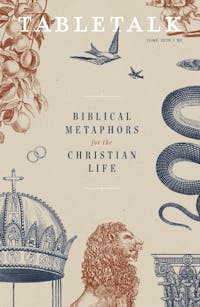
Request your free, three-month trial to Tabletalk magazine. You’ll receive the print issue monthly and gain immediate digital access to decades of archives. This trial is risk-free. No credit card required.
Try Tabletalk NowAlready receive Tabletalk magazine every month?
Verify your email address to gain unlimited access.
In the middle ages, as the church in Rome became more and more corrupt, certain doctrines that were promulgated by the church became suspect. One was the church’s insistence on the dual authority of the church and the Word. Of course, when it appeared that the church and the Word were in conflict, the church in Rome emerged (in its own thinking) as primary. As the self-designated, sole authoritative interpreter of the Word, Rome had the final say in all things biblical.
This self-designated authority was one of the chief targets of the Reformers, and their critique was encapsulated in the phrase sola Scriptura—Scripture alone. By this teaching, the Reformers argued that Rome is fallible, whereas the Word of God is not. Thus, when the two are in conflict, the individual Christian is bound by the Word of God to stand against Rome. The conscience of the believer is to be bound solely by God’s Word and no other.
This was clearly demonstrated in the response of Martin Luther when he stood before the Diet of Worms in 1521 and stated:
Unless I am convinced by Scripture and by plain reason and not by Popes and councils who have so often contradicted themselves, my conscience is captive to the Word of God. To go against conscience is neither right nor safe. I cannot and I will not recant.
A corollary to the doctrine of sola Scriptura is the doctrine of Christian liberty, a doctrine that guards against the unlawful usurpation or abuse of authority by people or institutions over the consciences of God’s people. This doctrine states that if Scripture (or a truth legitimately deduced from it) does not address a particular ethical issue, the Christian is at liberty to decide—his conscience cannot be bound by anyone. Thus, the Christian is protected from the tyranny of human authorities or opinions.
Theologians describe areas of liberty as adiaphora—matters not essential to the faith. The word comes from the Greek a-, negation, and diaphora, “differentiable.” Putting them together, adiaphora means “not differentiable.” Again, given no moral mandate from Scripture, the Christian is free to choose based on his preferences.
The doctrine of Christian liberty was no small issue in the Reformation; some would argue that it was one of the prime issues. But why was it so important to the Reformers? John Calvin is helpful here:
But these matters [of Christian liberty] are more important than is commonly believed. For when consciences once ensnare themselves, they enter a long and inextricable maze, not easy to get out of. If a man begins to doubt whether he may use linen for sheets, shirts, handkerchiefs, and napkins, he will afterward be uncertain also about hemp; finally, doubt will even arise over tow. . . . For all those entangled in such doubts, wherever they turn, see offense of conscience everywhere present. (Institutes, 3.19.7)
When a Christian chooses to make a biblically neutral act into something universally wrong—not just for himself but also for others—he steps onto a slippery slope with no biblical constraints. This is one form of legalism; it makes law out of liberty, and its effect is to wrap up the conscience of believers and confuse the God-given categories of law and liberty.
What Christian Liberty Is Not
Because of the proliferation of man-made regulations even (especially?) in the church, our church has added a lesson in the visitors class titled “What We Are Not as a Church.” We now have more than twenty-five bullet points to discourage people who are coming with any agenda designed to bind the consciences of believers.
But as is often the case, we can veer from one side of the road to avoid a ditch only to find ourselves in the ditch on the other side. The doctrine of Christian liberty can be abused by careless Christians who misunderstand and/or misuse the doctrine. Paul comes to the rescue here. Note his words in Galatians 5:13: “For you were called to freedom, brothers. Only do not use your freedom as an opportunity for the flesh, but through love serve one another.” Peter agrees: “Live as people who are free, not using your freedom as a cover-up for evil, but living as servants of God” (1 Peter 2:16). Areas of Christian liberty are not an excuse for sin.
More instruction is readily available in Romans 14. Much as moderns might debate the use of alcohol, the early church debated about food that had been sacrificed to idols: Should they eat that food or not? Paul provided two principles that we should consider, and we find both in Romans 14:3: “Let not the one who eats [food that had been sacrificed to idols] despise the one who abstains, and let not the one who abstains pass judgment on the one who eats, for God has welcomed him.”
First, stronger brothers often look down on weaker brothers, and Paul warns them to guard against arrogance. But second, note that the one who abstains also has an obligation: he is not to judge the one who eats. That is, he does not have the right to pass judgment on his brother—to call an act a sin that God has not so designated. Paul’s counsel in the end is this: “So then let us pursue what makes for peace and for mutual upbuilding” (v. 19). Serving each other is the order of the day, not flaunting our freedom or disdaining the one exercising it.
Christians with hearts aflame for God come in all shapes, sizes, and practices of liberties. And God calls us to honest self-evaluation in His presence before we turn our attention to our brothers and sisters (Matt. 7:1; Rom. 14:22–23).
